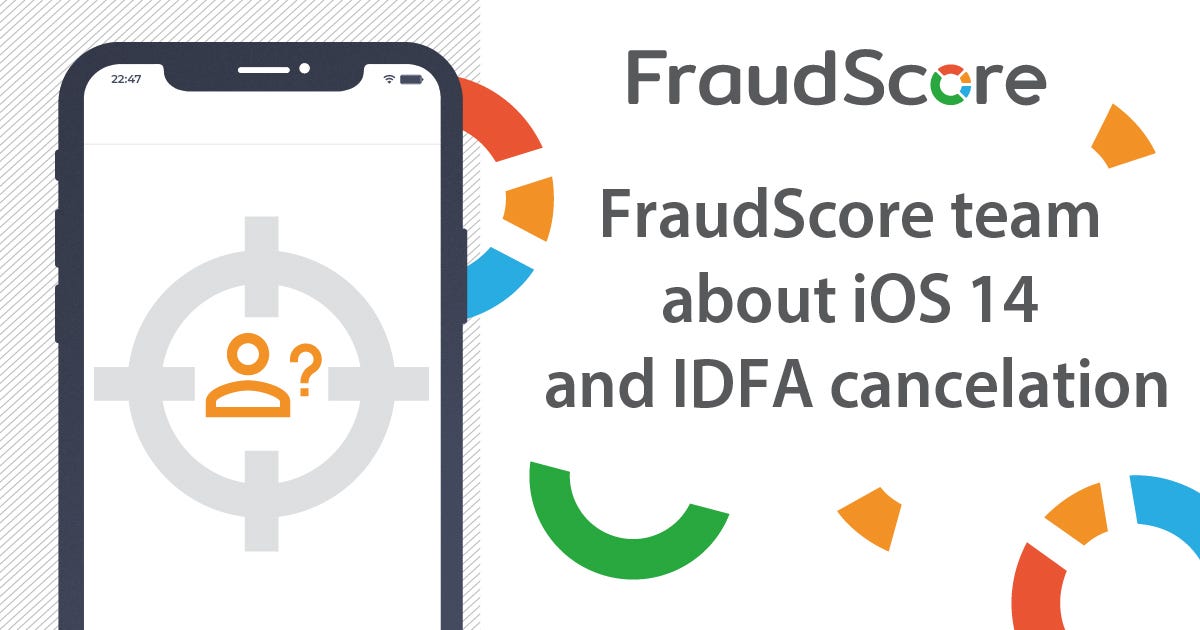iOS 14: the “death of IDFA” and the effect for ad fraud detection

It’s already a well-known fact — iOS 14 is coming and it’s bringing many changes to the online advertising industry. And in spite of the fact that on September,3 Apple announced that they will postpone some changes that FraudScore team is going to discuss in this post, we still will try to answer the questions that we’ve already received from our partners and clients. And explain whether the changes that Apple will be introducing pose a risk for ad fraud detection efficiency.
So first, what is going to change and why did the news turn out to be a shock to the industry?
Apple introduced SKAdNetwork — its homegrown solution for attribution. Apple takes control over the verification of clicks and whether they lead to install. The information will be directly shared with ad networks. As a result, there will be no need to pass IDFA. So what happens with IDFA and why is it so shocking for the industry?
IDFA (iOS identifier for advertisers), a very important parameter in attribution and user tracking, will be limited and subject to major changes in each Apple device. For now (till iOS 14 is here) Apple is using a “Limit Ad Tracking” setting in the iOS devices. It either turns on or off all the ad tracking for all the apps that are installed on the user’s phone. To be honest, not all the users knew about this opt-in option at all =)
With iOS 14 the user will get a chance to set the ad tracking for each app that he has installed. Every app will have to use the AppTracking Transparency framework to receive the user’s consent to use his data. It means that until the user decides whether to allow or block ad tracking, the app won’t probably be able to work properly on iOS 14 (this strict approach will be applied somewhere at the beginning of 2021, according to recent updates from Apple).
The loss of IDFAs will basically mean that no user-level tracking will be available as it used to be. It looks like the advertisers will have to adapt to the new realities in tracking users and find new parameters to properly display in-app ads. It will also have a major effect on the way that companies (brands, developers, media owners etc) interact with users in the app — they now have to disclose what data they collect, why they do that and what third-parties receive such data.
The question that FraudScore team has received many times in the last couple of months was — whether these changes in IDFA will affect FraudScore anti-fraud capacities. We’ve asked FraudScore COO Alexander Shirinkin to share his ideas and answer the most frequently asked questions:
“In simple terms, the changes that are going to happen with IDFA will not affect the capabilities and accuracy of FraudScore’s fraud detection. I know there are solutions on the market that rely on IDFA as the main user parameter when looking for fraud, but FraudScore is not one of them. The traffic analysis that FraudScore performs is based on other unique metrics and will not suffer from the loss of IDFA.”
And the question about fraudsters and what they might undertake when iOS 14 comes:
“Well, it’s hard to say for sure what actions will fraudsters take to adapt to new realities in iOS 14. But when you know how incredibly creative they get when it comes to stealing money, it’s obvious that changes are going to happen in ad fraud. Whether the new algorithms will be created or new players will enter the arena, it will happen eventually. The advice that I can give to marketers is as always — shield up and trust independent anti-fraud solutions.”
We’ve also asked FraudScore CEO Dmitry Isakov “What do you think about the changes that Apple is bringing to the online ads world with iOS 14?”
“On the one hand, it means that every app now has to ask the user if he allows the tracking. So the user will actually see the popup with a request from each app. And then decide whether to allow the tracking. It looks like there is going to be a lot of work for those apps — explain to the user what they need to use the tracking for and what benefit there is for the user. The latest news from Apple actually gives more hope to developers as they now have more time to test and focus on the most appropriate way to ask users for their consent. Developers now have more time to adapt to the new Apple realities with user data privacy processing.
But on the other hand, it means that users might be allowing IDFA tracking to the apps that they actually use, the brands they trust. It looks like these changes that Apple is embarking on is to let the user decide for himself. And protect his privacy from those apps (and companies) that he doesn’t really trust. For example, the user might block tracking for a “calculator app” that he has installed, but happily allow it for a clothing brand app that he constantly uses.”
When iOS 14 comes, there might be more changes and the situation will develop rapidly, FraudScore analytics team is closely working with our partners and clients to answer their questions and concerns about ad fraud in iOS 14. If you already want to discuss something — feel free to contact FraudScore team via sales@fraudscore.mobi